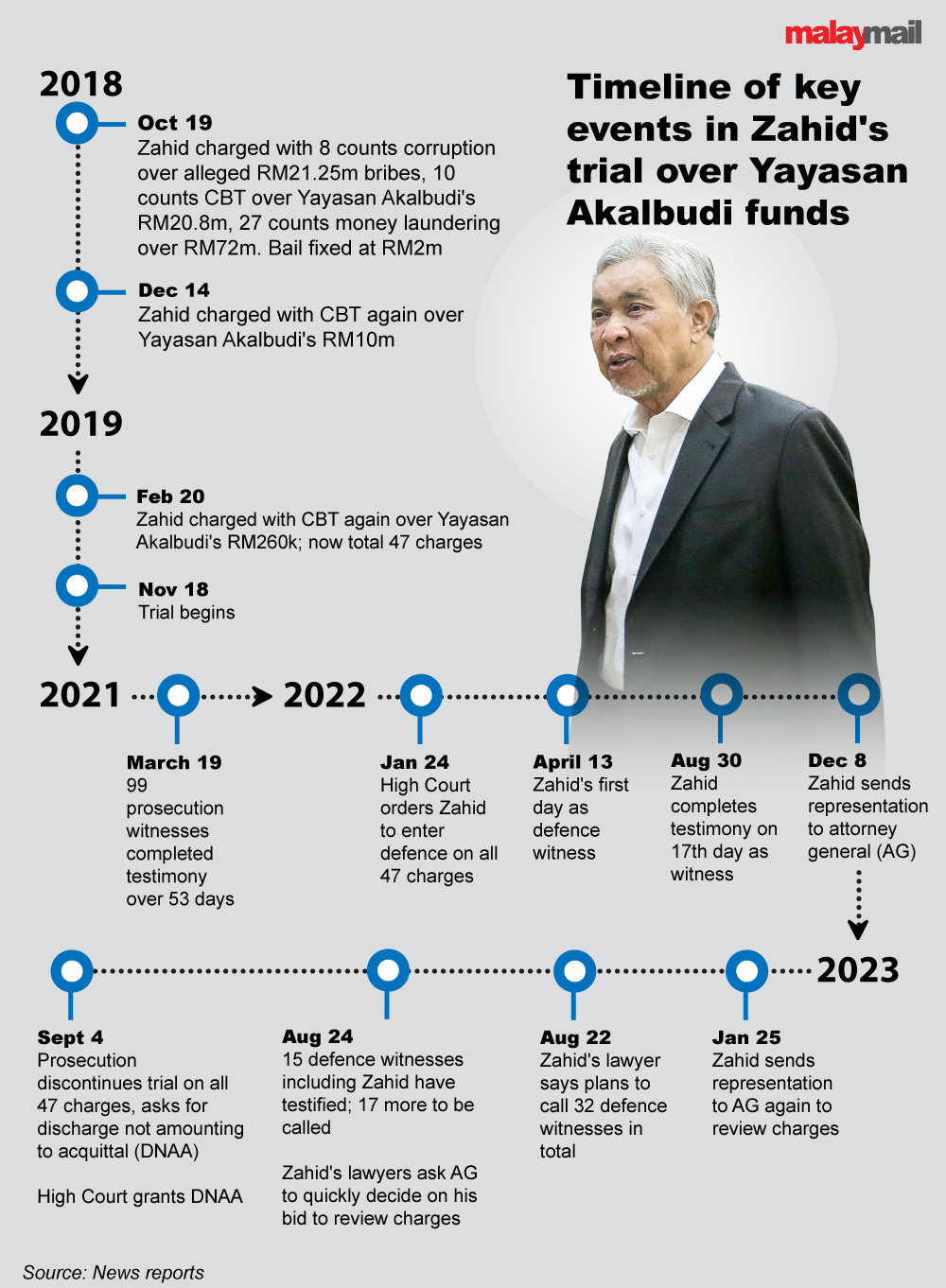KUALA LUMPUR, Sept 8 — The Attorney General’s Chambers (AGC) told the Malaysian Bar today that it did not “withdraw” the charges against Deputy Prime Minister Datuk Seri Ahmad Zahid Hamidi but was acting in good faith over new representations made to it over his case.
It said it could not outright ignore Zahid’s representations alleging political persecution, citing among others the government’s plan to convene a royal commission of inquiry into allegations against former AG Tan Sri Tommy Thomas, under whom the charges against the Umno president had been initiated.
“We never used the word ‘withdraw’ in the case involving Zahid as the Malaysian Bar accused us of. According to Article 145(3) of the Federal Constitution the discretion lies with the attorney general to halt any criminal proceedings and if referred to subsection 254(1) of the criminal procedure code it states that in if the Public Prosecutor (or any other person recognized in law as being his alter ego) withdraws a charge, then subsection 254(1) shall apply. In this instance, the court must (‘shall’) order a stay of proceedings and discharge the accused.
“Despite there being a prima facie case already proven the law states the AG can still stop the case from proceeding. It’s also important to remember that this isn’t the first time this has happened where a case was stopped after a prima facie case was proven,” it said in a statement.
Yesterday, the Malaysian Bar said the AGC’s move to drop the charges against Zahid “rings hollow” or was insincere, as it did not explain the attorney general’s decision to withdraw all 47 charges but highlighted the court’s role instead.
Malaysian Bar president Karen Cheah Yee Lynn said it was the prosecution who withdrew all 47 charges against Zahid and that it was the prosecution who asked the High Court on Monday to grant a discharge not amounting to acquittal (DNAA) on Zahid, with the prosecution alluding to the need for the Malaysian Anti-Corruption Commission (MACC) to carry out further investigations.
Today, the AGC said it had previously set out 11 reasons for its decision that included, among others, being in the best decision to arrive at the conclusion based on the new evidence and representations that were presented in the case.
It also said it was also not the AGC’s role to judge a person or to secure a conviction at all costs.
“Instead, it is the department’s sworn duty to ensure the processes of law are upheld based on the Blackstone Ratio which states, ‘It is better that ten guilty persons escape than that one innocent suffer.’”
The AGC said the new information it was reviewing in Zahid included at least 200 pages per representation, which would take time to analyse.
Consequently, it said it was only proper to conditionally discharge Zahid until the new information could be completely digested.
The prosecution decided to discontinue and drop the Yayasan Akalbudi trial against Zahid — which resulted in the High Court granting a discharge not amounting to an acquittal (DNAA) on Zahid for all 47 charges he faced.
Trial judge Datuk Collin Lawrence Sequerah when delivering his decision in the High Court yesterday said that the prosecution had “given cogent reasons” it sought the DNAA.
This came after Deputy Public Prosecutor Datuk Mohd Dusuki Mokhtar explained that further investigations on Zahid’s case had to be carried out, following the representations from Zahid to the attorney general to ask for all 47 charges to be reviewed.
Zahid, who is also Umno president and Barisan Nasional chairman, faced 47 charges in this case, namely, 12 counts of criminal breach of trust in relation to over RM31 million of his charitable organisation Yayasan Akalbudi’s funds, 27 counts of money laundering, and eight counts of bribery charges of over RM21.25 million in alleged bribes.
Yayasan Akalbudi was founded with the purported objectives of receiving and administering funds for the eradication of poverty and enhancing the welfare of the poor.
The decision to drop the case despite the prosecution previously having shown a prima facie case, was panned by both sides of the political divide.























